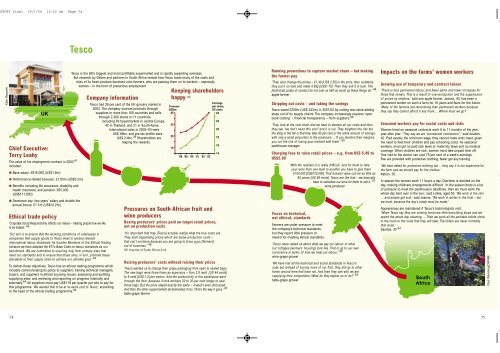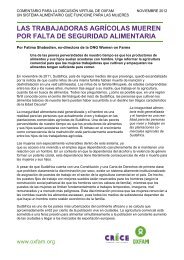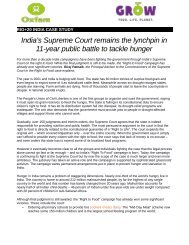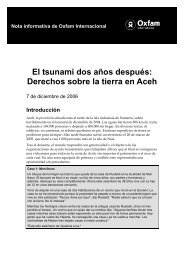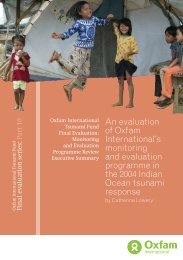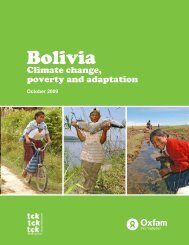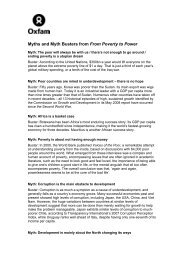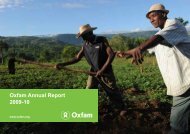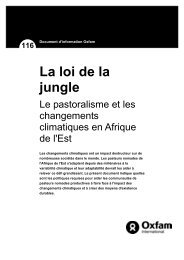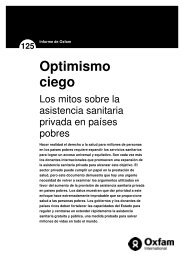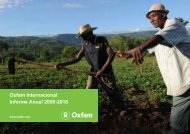Trading Away Our Rights - Oxfam International
Trading Away Our Rights - Oxfam International
Trading Away Our Rights - Oxfam International
You also want an ePaper? Increase the reach of your titles
YUMPU automatically turns print PDFs into web optimized ePapers that Google loves.
EPORT final 19/1/04 10:20 am Page 74TescoKate RaworthUKChief Executive:Terry LeahyThe value of his employment contract in 2003 41includes:● Base salary: £916,000 (US$1.6m)● Performance-related bonuses: £1.85m (US$3.2m)● Benefits including life assurance, disability andhealth insurance, and pension: £65,000(US$111,000)● Severance pay: two years’ salary and double theannual bonus: £7.1m (US$12.2m)Ethical trade policy‘Corporate Social Responsibility reflects our Values – treating people how we liketo be treated.’ 42‘<strong>Our</strong> aim is to ensure that the working conditions of employees incompanies that supply goods to Tesco meet or exceed relevantinternational labour standards. As founder Members of the Ethical <strong>Trading</strong>Initiative we have adopted the ETI’s Base Code on labour standards as ourbenchmark. We are committed to sourcing only from primary sites thatmeet our standards and to ensure that those sites, in turn, promote thesestandards to their supply chain to achieve our ultimate goal.’ 43To deliver these objectives, Tesco has an ethical trading programme whichincludes communicating its policy to suppliers; training technical managers,buyers, and suppliers in ethical sourcing issues; assessing and auditingsupplying sites; and reviewing and reporting on progress internally andexternally. 44 All suppliers must pay US$119 per quarter per site to pay forthis programme. ‘We wanted that to be at no extra cost to Tesco,’ accordingto the head of the ethical trading programme. 45Tesco is the UK’s biggest and most profitable supermarket and is rapidly expanding overseas.But research by <strong>Oxfam</strong> and partners in South Africa reveals how Tesco loads many of the costs andrisks of its fresh-produce business onto farmers, who are passing them on to workers – especiallywomen – in the form of precarious employment.Company informationTesco had 26 per cent of the UK grocery market in2003. The company sources products throughsuppliers in more than 100 countries and sellsthrough 2,300 stores in 11 countries,including 83 hypermarkets in central Europe,42 in Thailand, and 21 in South Korea.<strong>International</strong> sales in 2002–03 wereUS$ 49bn, and pre-tax profits wereUS$ 2.4bn. 39 Shareholders arereaping the rewards.Keeping shareholdershappy 40 24TurnoverUS$bn45Pressures on South African fruit andwine producersBasing producers’ prices paid on target retail prices,not on production costs352515’98 ’99 ’00 ’01 ’02 ’03Earningsper share,US cents‘It’s important that they [Tesco] actually realize what the true costs are.They start negotiating prices which are below production costs –that can’t continue because you are going to force guys [farmers]out of business.’ 46UK importer of South African fruitRaising producers’ costs without raising their prices‘Tesco wanted us to change their grape packaging from open to sealed bags.The new bags were three times as expensive – from 2.8 rand [US 44 cents]to 8 rand [US$ 1.2] per carton. And the productivity in the packhouse wentthrough the floor, because it took workers 20 to 30 per cent longer to sealthose bags. But the price stayed exactly the same – it wasn’t even discussed.And then the other supermarkets all demanded it too. That’s the way it goes.’ 47table-grape farmer2220181614Running promotions to capture market share – but makingthe farmer pay‘They also change the prices – £1.49 [US$ 2.55] is the price, then suddenlythey put it on sale and make it 99p [US$1.70]. Then they sell it in bulk. The[technical] codes of conduct do not cost us half as much as these things do.’ 48apple farmerStripping out costs – and taking the savingsTesco saved £200m (US$ 343m) in 2001/02 by cutting low-value-addingsteps out of its supply chains. The company increasingly requires ‘openbook costing’ – financial transparency – from suppliers. 49‘They look at the cost chain and we have to declare all our costs and thenthey say “we don’t need this cost” and it is cut. They heighten the risk butthe sting in the tail is that they take 80 per cent or the entire amount of savings,with only a small proportion to the producers … If you mention their margins,you run the risk of losing your toehold with them.’ 50packhouse managerCharging fees to raise retail prices – e.g. from US$ 5.49 toUS$5.99‘With the retailers it is really difficult. Just for them to takeyour wine from one level to another you have to give them£100,000 [US$170,000]. That bracket value can be as little as50 pence [US 86 cents]. Tesco are like that – we basicallyhave to subsidise our wine for them to sell it.’ 51wine producerFocus on technical,not ethical, standardsFarmers are under pressure to meetthe company’s technical standards,but they report little pressure orreward for meeting ethical standards.‘Tesco never asked us about what we pay our labour or whatour cottages [workers’ housing] look like. That is up to our ownconscience in terms of how we treat our labour.’ 52wine-grape grower‘We have met all the technical and social standards in Tesco’scode but instead of buying more of our fruit, they still go to otherfarms around here that have not. And then they ask why we aresupplying their competitors. What do they expect us to do?’ 53table-grape growerImpacts on the farms’ women workersGrowing use of temporary and contract labour‘There is less permanent labour, and fewer perks and lower increases forthose that remain. This is a result of over-production and the suppressionof prices by retailers,’ said one apple farmer. Joanna, 40, has been apermanent worker on such a farm for 18 years and fears for the future.‘Many of the farmers are retrenching their permanent workers becausethey say they cannot afford it any more … Where must we go?’Seasonal workers pay for social costs and risksWomen hired on seasonal contracts work 8 to 11 months of the year,year after year. ‘They say we are “permanent contractors”,’ said Analien,42. Paid exactly the minimum wage, they cannot make ends meet, giventhe need to feed their children and pay schooling costs. As seasonalworkers, most get no paid sick leave or maternity leave and no medicalcoverage. When children are sick, women must take unpaid time off.One visit to the doctor can cost 75 per cent of a week’s earnings.Few are provided with protective clothing, fewer get any training.‘We have asked for protective clothing but ... they say it is too expensive forthe farm and we should pay for the clothes.’Katryn, 35.In season the women work 11 hours a day. Overtime is decided on theday, making childcare arrangements difficult. ‘In the season there is a lotof pressure to meet the packhouse’s deadlines, then we must work thewhole day bent over in the sun,’ said Linkie, aged 50. ‘We work in the rain… and people get sick,’ said Joanna. ‘We work in winter in the frost – butwe must, because the day’s totals must be made.’Appearances are maintained if Tesco’s technologists visit.‘When Tesco say they are coming tomorrow then everything stops and wespend the whole day cleaning. ... Then we push all the portable toilets closeto the road on the route that they will take. The toilets are never normallythat clean.’Saartjie, 30 54SouthAfricaPaul Weinberg/OXFAM7475


